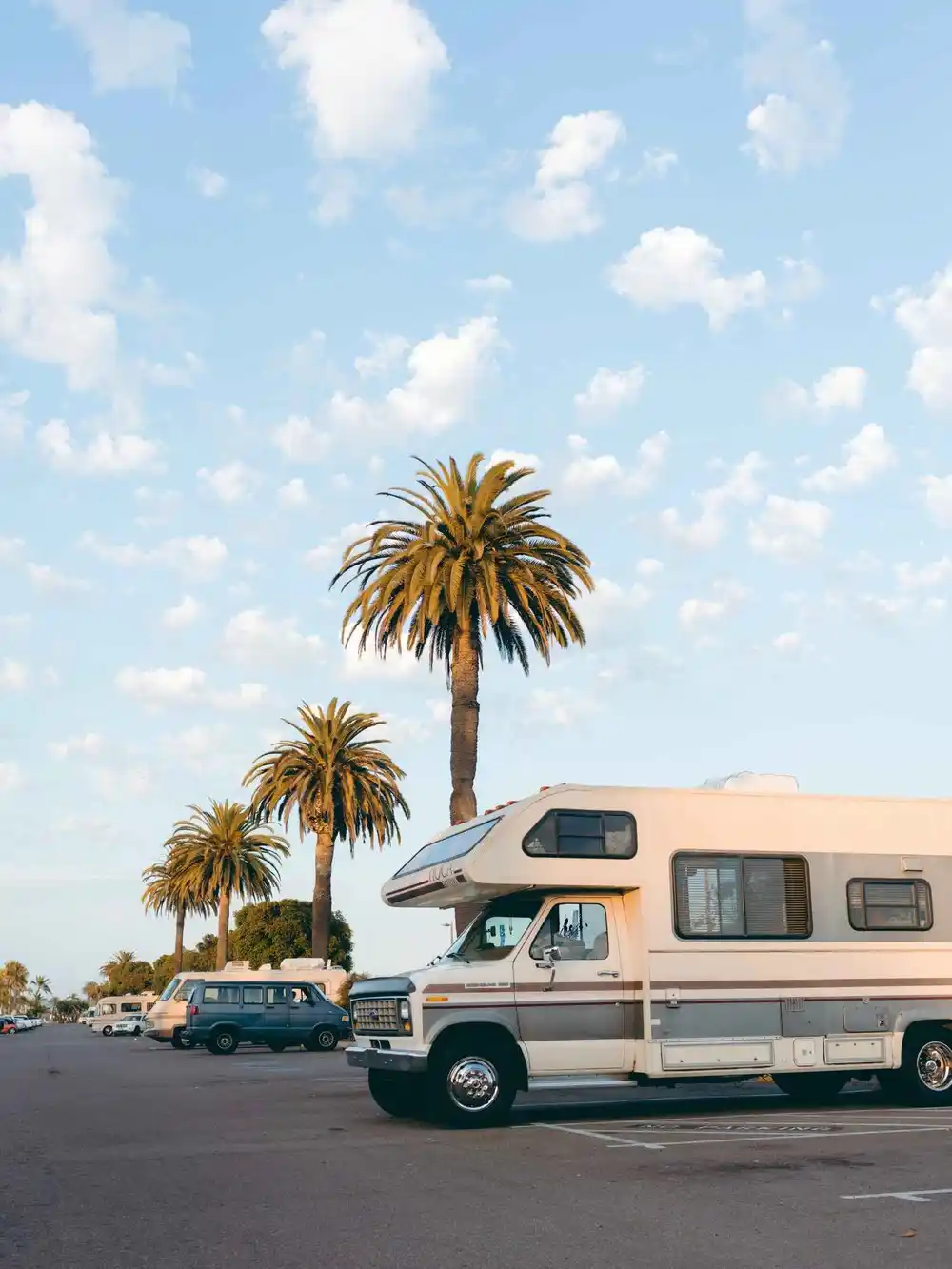| Key Takeaways |
|---|
| RV stands for recreational vehicle and refers to a motor vehicle or trailer that has living quarters for accommodation and recreation. |
| RVs come in different types, sizes, and classes, depending on your needs and preferences. |
| RVs offer many benefits, such as freedom, flexibility, comfort, convenience, and cost-effectiveness. |
| RVs also have some challenges, such as maintenance, parking, driving, and legal issues. |
| Before buying or renting an RV, you should do your research, compare options, and plan ahead. |
If you love traveling and exploring new places, you might have heard of RVs. But what exactly is an RV? How does it work? What are the advantages and disadvantages of RVing? And how can you get started with RVing?
In this article, we will answer all these questions and more. We will explain what an RV is, what types of RVs are available, what benefits and challenges they offer, and what tips and resources you can use to make your RV adventure a success.
What is an RV?
RV stands for recreational vehicle. It is a general term that covers any motor vehicle or trailer that has living quarters designed for accommodation and recreation. ¹
RVs are also known as motorhomes, campervans, caravans, travel trailers, fifth wheels, pop-up campers, truck campers, and more. They are popular among travelers who want to enjoy the outdoors without sacrificing the comforts of home.
RVs can range from simple and small to luxurious and large. They can have various features and amenities, such as a kitchen, a bathroom, a bedroom, a living area, a dining area, a storage space, an entertainment system, a heating and cooling system, a generator, a solar panel, and more.
Some RVs are self-propelled vehicles that you can drive like a car or a bus. These are called motorized RVs or drivable RVs. They are typically built on a truck or bus chassis and have an engine and a transmission.
Other RVs are towable vehicles that you can attach to another vehicle, such as a car, a truck, or an SUV. These are called towable RVs or trailer RVs. They do not have an engine or a transmission and rely on the towing vehicle for power and mobility.
What types of RVs are there?
There are many types of RVs to choose from depending on your needs and preferences. Here are some of the most common ones:
Class A Motorhomes
Class A motorhomes are the largest and most expensive type of RV. They can be up to 45 feet long and can accommodate up to eight people. They offer the most space and comfort among all RVs and often have high-end features and amenities.
Class A motorhomes are ideal for long-term travelers who want to live in their RV full-time or part-time. They are also suitable for large families or groups who need plenty of room and privacy.
However, Class A motorhomes also have some drawbacks. They are difficult to drive and park due to their size and weight. They consume a lot of gas and require regular maintenance. They may also have restrictions on where they can go or stay due to their height and length.
Class B Motorhomes
Class B motorhomes are also known as camper vans or conversion vans. They are the smallest and most affordable type of motorized RV. They are usually built on a standard van chassis and have a raised roof for extra headroom.
Class B motorhomes can fit up to four people but are more comfortable for two. They offer basic features and amenities, such as a bed, a kitchenette, a toilet, and sometimes a shower. They are easy to drive and park like a regular car and can access most roads and campgrounds.
Class B motorhomes are ideal for solo travelers or couples who want to travel light and simple. They are also suitable for short-term travelers who do not need much space or luxury.
However, Class B motorhomes also have some limitations. They have very limited living space and storage space. They may not have enough facilities or utilities for some people’s needs. They may also lack insulation or ventilation for extreme weather conditions.
Class C Motorhomes
Class C motorhomes are somewhere between Class A and Class B motorhomes in terms of size, price, and features. They are usually built on a cutaway van chassis or a truck chassis and have an over-the-cab area that can be used as extra sleeping space or storage space.
Class C motorhomes can accommodate up to six people but are more comfortable for four. They offer moderate features and amenities, such as a bed, a kitchen, a bathroom, a living area, and sometimes a slide-out section that expands the living space when parked.
Class C motorhomes are ideal for medium-term travelers who want to balance comfort and convenience. They are also suitable for small families or groups who need some room and flexibility.
However, Class C motorhomes also have some challenges. They are not as easy to drive and park as Class B motorhomes but not as spacious and luxurious as Class A motorhomes. They may also have lower gas mileage and higher maintenance costs than Class B motorhomes.
Travel Trailers
Travel trailers are the most common type of towable RV. They are trailers that have a standard ball hitch that attaches to the rear bumper of the towing vehicle. They come in various sizes, shapes, and styles, from small teardrop trailers to large Airstream trailers.
Travel trailers can sleep up to eight people but are more comfortable for four to six. They offer a range of features and amenities, such as a bed, a kitchen, a bathroom, a living area, and sometimes a slide-out section that expands the living space when parked.
Travel trailers are ideal for travelers who want to have a separate vehicle for driving and a separate living space for camping. They are also suitable for travelers who want to have more options and customization in their RV.
However, travel trailers also have some drawbacks. They require a compatible towing vehicle that can handle the weight and size of the trailer. They also require more skill and practice to tow, maneuver, and park safely. They may also have less stability and aerodynamics than motorized RVs.
Fifth Wheel Trailers
Fifth wheel trailers are similar to travel trailers but have a different hitch system. They have a gooseneck hitch that connects to a special fifth wheel hitch in the bed of the towing vehicle, usually a pickup truck. This allows for more stability and maneuverability than a standard ball hitch.
Fifth wheel trailers are usually larger and heavier than travel trailers and can accommodate up to eight people but are more comfortable for four to six. They offer more features and amenities than travel trailers, such as a bed, a kitchen, a bathroom, a living area, and sometimes multiple slide-out sections that expand the living space when parked.
Fifth wheel trailers are ideal for travelers who want to have the most space and comfort in their towable RV. They are also suitable for travelers who want to have more luxury and style in their RV.
However, fifth wheel trailers also have some disadvantages. They require a compatible towing vehicle that can handle the weight and size of the trailer and has a fifth wheel hitch installed. They also require more skill and practice to tow, maneuver, and park safely. They may also have higher gas mileage and maintenance costs than travel trailers.
Pop-up Campers
Pop-up campers are also known as folding or tent trailers. They are trailers that have collapsible sides that fold down when towing and fold up when camping. This makes them more compact and lightweight than other types of RVs.
Pop-up campers can sleep up to six people but are more comfortable for two to four. They offer basic features and amenities, such as a bed, a kitchenette, a dinette, and sometimes a toilet or a shower. They are easy to tow and park with most vehicles and can access most roads and campgrounds.
Pop-up campers are ideal for travelers who want to have a simple and affordable RV experience. They are also suitable for travelers who want to have more of an outdoor feel in their RV.
However, pop-up campers also have some limitations. They have very limited living space and storage space. They may not have enough facilities or utilities for some people’s needs. They may also lack insulation or ventilation for extreme weather conditions.
Truck Campers
Truck campers are also known as slide-in or cab-over campers. They are units that fit into the bed or onto the chassis of a pickup truck or flatbed truck. They can be easily mounted or removed from the truck depending on your needs.
Truck campers can sleep up to four people but are more comfortable for two. They offer basic features and amenities, such as a bed, a kitchenette, a toilet, and sometimes a shower. They are easy to drive and park with most trucks and can access most roads and campgrounds.
Truck campers are ideal for travelers who want to have a versatile and adaptable RV option. They are also suitable for travelers who want to have more mobility and off-road capability in their RV.
However, truck campers also have some drawbacks. They have very limited living space and storage space. They may not have enough facilities or utilities for some people’s needs. They may also affect the performance and safety of the truck.
What are the benefits of RVing?
RVing offers many benefits that make it an attractive and enjoyable way of traveling. Here are some of them:
Freedom
RVing gives you the freedom to go where you want, when you want, how you want. You can choose your own destinations, routes, schedules, activities, and pace. You can explore new places or revisit old favorites. You can stay as long or as short as you like in each location.
Convenience
RVing gives you the convenience of having everything you need in one place. You can have your own home on wheels that has your personal belongings, your favorite foods, your comfortable bed, your private bathroom, and more. You do not have to worry about packing and unpacking, checking in and out, finding and booking accommodations, or eating out.
Comfort
RVing gives you the comfort of having your own space and privacy. You can have your own living area that has your preferred settings, your preferred layout, your preferred decor, and more. You do not have to share facilities or amenities with strangers, deal with noise or crowds, or follow rules or regulations.
Cost-effectiveness
RVing gives you the cost-effectiveness of saving money on travel expenses. You can have your own transportation and accommodation that can be cheaper than renting a car and staying in a hotel. You can also save money on food by cooking your own meals instead of eating out. You can also save money on entertainment by enjoying free or low-cost activities in nature or in local communities.
Fun
RVing gives you the fun of having an adventure and a challenge. You can have the opportunity to experience new things, learn new skills, meet new people, and discover new aspects of yourself. You can also have the satisfaction of overcoming obstacles, solving problems, and achieving goals.
What are the challenges of RVing?
RVing also has some challenges that make it a demanding and stressful way of traveling. Here are some of them:
Maintenance
RVing requires regular maintenance and repairs of your RV and your towing vehicle. You have to check and service various systems and components, such as the engine, the transmission, the brakes, the tires, the batteries, the plumbing, the electrical, the propane, and more. You also have to deal with breakdowns, malfunctions, leaks, damages, and accidents that may occur on the road or at the campground.
Parking
RVing requires finding and securing a suitable parking spot for your RV and your towing vehicle. You have to consider the size, weight, height, and length of your RV and your towing vehicle when looking for a parking space. You also have to consider the availability, accessibility, legality, safety, and cost of parking options.
Driving
RVing requires driving safely and skillfully with your RV and your towing vehicle. You have to be aware of the speed limits, traffic rules, road conditions, weather conditions, and other factors that may affect your driving. You also have to be prepared for emergencies, hazards, detours, delays, and tolls that may occur on the road.
Legal Issues
RVing requires complying with various legal issues that may vary from state to state or country to country. You have to register and insure your RV and your towing vehicle according to the local laws. You also have to obtain and carry the proper licenses, permits, documents, and stickers that may be required for driving or camping with your RV.
How can you get started with RVing?
If you are interested in RVing but do not know where to start, here are some tips and resources that can help you:
Do Your Research
Before buying or renting an RV, you should do your research on what type of RV suits your needs and preferences. You should consider factors such as:
- Your budget
- Your travel style
- Your travel frequency
- Your travel duration
- Your travel destination
- Your travel companions
- Your storage space
- Your towing vehicle
You should also research on what features and amenities you want or need in your RV. You should consider factors such as:
- Your sleeping space
- Your cooking space
- Your dining space
- Your bathroom space
- Your living space
- Your storage space
- Your entertainment system
- Your heating and cooling system
- Your generator
- Your solar panel
You can use online tools such as [RV Finder] or [RV Selector] to help you find the best RV for you.
Compare Options
After doing your research on what type of RV suits you best, you should compare options from different sources. You should consider factors such as:
- The price
- The condition
- The warranty
- The service
- The reviews
- The reputation
You can use online tools such as RV Trader or RVT to help you find new or used RVs for sale near you.
You can also use online tools such as Outdoorsy or RVshare to help you find RVs for rent near you.
Plan Ahead
Before hitting the road with your RV, you should plan ahead for your trip. You should consider factors such as:
- Your route
- Your schedule
- Your activities
- Your budget
- Your packing list
- Your checklist
You can use online tools such as [RV Trip Wizard] or [Roadtrippers] to help you plan your RV trip.
You can also use online tools such as Campendium or Allstays to help you find campgrounds, RV parks, or boondocking spots near you.
Conclusion
RVing is a great way to travel and enjoy the outdoors. It offers many benefits, such as freedom, convenience, comfort, cost-effectiveness, and fun. It also has some challenges, such as maintenance, parking, driving, and legal issues. Before buying or renting an RV, you should do your research, compare options, and plan ahead. With the right RV and the right preparation, you can have an amazing RV adventure.





Use the share button below if you liked it.
It makes me smile, when I see it.